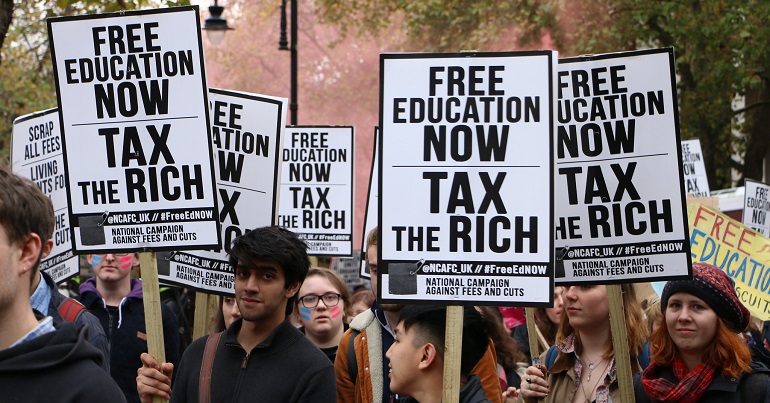A TRULY RADICAL NUS – BEYOND TUITION FEES #2

It is a time of extraordinary potential for change in UK Higher Education. Labour’s promise to end tuition fees has defied the critics and united many behind Corbyn’s political project. But what will the implications for universities be if this comes to pass? And what can we do to leverage this progress? In this new series, the Norwich Radical and Bright Green are bringing together perspectives from across the sector to explore these questions.
Over the last year the NUS has been a shadow of its former self, riddled with accusations of bullying from its President and marked by its failure to engage with the largest upswelling of campus activism this country has seen in years. It was bizarre enough that it refused to back demonstrations for Free Education last year, implying a denial that the end of tuition fees would be a benefit for students. But that pales in comparison to the extraordinary lack of NUS involvement in the recent UCU strikes. While its members joined the picket lines and entered occupation up and down the country, NUS chose to stay silent when our academic staff most needed their support. Instead it has focused its attention on single-use plastics and votes at 16 campaigns, an arch demonstration of the shift from the radical routes of the organisation to the more centrist, liberal place it currently holds. It is very telling that its recent National Conference saw delegates resort to direct action in order to try and break through the bureaucracy and filibustering that is currently rife within the organisation.
This shift cannot be seen in isolation from the rise in tuition fees and the acceptance of their existence within the higher education sector. Everyone remembers the protests at Milbank in 2010, and how NUS was leading the charge against the fee rise. Since then, however, the overwhelming majority of NUS’ elected officers have laid down and accepted the idea of fees as part of HE, refusing to challenge their existence and in some cases actively defending them.
This post-2010 shift has left many wondering: what would NUS look like in a world where free education exists? The answer can be found in its past activism, as well as in some of the movements currently occurring within it.
Before its Blair-era shift to the centre ground, NUS fought for real changes in the HE system and wider society. It has a proud history of being at the forefront of the LGBT+ rights movement in the 1960s and ‘70s, leading the fight for decriminalisation. It was also one of the key players in the anti-apartheid movement in the UK. Many students from the time remember being involved in a boycott of Barclays Bank in the late ‘70s and ‘80s, which led to the bank’s pivotal divestment from South Africa and withdrawal of support for its regime. These campaigns represent a past that a majority of NUS presidents and vice-presidents in the tuition fees era seem to have forgotten, if not totally ignored.
However, looking past its moderate leadership, the future of NUS looks similar to its past. The National Campaign Against Fees and Cuts (NCAFC) have run some of the best campaigns I’ve seen in the student movement, from within NUS and beyond it. They’ve been at the centre of the free education movement in recent years, and have been key players in the student activism around the recent UCU strikes, including an unprecedented wave of over 20 occupations. These actions and many more show that there is still a strong activist core at NUS that remembers its radical past. Students bypassed a languishing national union, inspiring each other to fight against the cuts on their campuses and support their staff when they needed it most.
In the post-fees future, the NUS can return to its radical routes by embracing the ideas and ethos of NCAFC. The tactics and ideas used in the fight for Free Education can easily be applied to other campaigns, such as the Fossil Free movement. Whilst at the moment it only pays lip service to climate change and fossil fuel divestment, the post-fees NUS would be able to focus on offering support to the continued fight for our universities to end their investments in fossil fuels, as well as campaigns such as Divest Barclays, which harkens back to the anti-apartheid boycotts and may yet have just as much of an impact. Through campaigns like these, NUS can align with its members by showing its drive to make real positive change in the world in which it exists and operates, as opposed to the trivial impact it currently has.
In the post-fees world, as NUS becomes radical once more, campaigns on student welfare issues could likewise grow stronger. Whilst NUS does have policy to campaign for a living wage for all student workers, it has done very little outside of the usual press releases that offer no real information or news on the successes of the campaign. A move towards a radical NUS would herald a fight for every employer that relies on students as employees to pay the living wage, as well as putting pressure on our universities to pay all their staff a living wage. NUS could also do much more to fight for genuine resources for better mental health. We hear about the student mental health crisis at every conference, but NUS’ action never goes further than mere lip service and the occasional report. A more radical NUS would look to fight for this crisis to end using all the methods available to it, not relying only on those students who band together to take direct action of their own accord, but coordinating legitimised direct actions across the country as a union to overcome the tide of cuts to much-needed mental health services.
A future without tuition fees really isn’t that far off anymore. We have a legitimate chance of seeing it within the next 5 years, and it will be the spark that finally recreates a radical NUS. Examples from NUS’ past and NCAFC’s present show that there is a bright future for the national student movement in a post-fees world. It won’t be long until the NUS is a radical force once again.
If you’d be interested in contributing to this article series, contact either thenorwichradical@gmail.com or front-desk@project1-hvznj9e2s8.live-website.com with an article pitch.




Leave a Reply